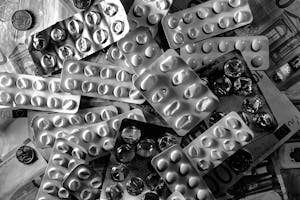June 16, 2025

Pharmaceutical plastic packaging is under increasing scrutiny as the industry looks for solutions that balance sustainability with functionality. Businesses are under increasing pressure to use environmentally friendly materials while also making sure that they meet the strict performance standards necessary for pharmaceutical protection.
The development of an innovative, sustainable blister pack represents a significant advancement in this area, offering a fully recyclable alternative to conventional PVC and aluminum-based blister packaging.
The pharmaceutical industry is increasingly adopting sustainability-driven practices, placing greater emphasis on packaging materials that lower carbon emissions and reduce resource consumption.
PharmaGuard from Südpack Medica is designed to address these environmental challenges through its monomaterial PP structure, which significantly lowers its overall ecological impact. Lifecycle assessments show that the new blister pack’s carbon footprint is up to 47% lower than that of traditional PVDC-coated PVC and aluminum blister packs.
More efficient manufacturing methods also help decrease energy and water usage, thereby preserving precious natural resources. Shifting to this sustainable alternative allows manufacturers to align with global sustainability efforts while maintaining high product quality and regulatory compliance.
A growing number of governments and regulatory bodies are implementing stricter sustainability mandates, making it essential for pharmaceutical companies to invest in low-emission packaging solutions. Switching to recyclable, low-impact materials now helps businesses future-proof their plastic packaging portfolios against evolving regulations and consumer expectations.
Difficulties in recycling multilayer pharmaceutical blister packs have long been a challenge in the industry.
The combination of PVC, aluminum, and other materials used in this type of packaging results in complex waste streams, making it nearly impossible to recover usable materials from traditional blister packs. PharmaGuard solves this issue by using only polypropylene, which can be easily processed in existing plastic recycling systems.
Moving away from multi-layer packaging simplifies disposal and recycling, reducing the volume of medical packaging waste that ends up in landfills. The ability to recycle PharmaGuard within standard plastic recovery systems makes it a highly sustainable option for companies looking to improve their environmental impact without compromising product safety.
Sustainability is now a competitive advantage, with pharmaceutical companies being evaluated on their environmental commitments. Adopting fully recyclable plastic packaging strengthens corporate responsibility efforts while helping businesses meet regulatory benchmarks more efficiently.

Pharmaceutical blister packs must be produced efficiently, requiring materials that work well within automated production lines.
The PP webs on both top and bottom provide stable shrinkage and high transparency, making them compatible with standard packaging machinery while requiring minimal modifications. A wider sealing temperature range improves process adaptability, helping manufacturers maintain consistent sealing performance across various production environments.
Thermoforming performance of the bottom web also supports uniform cavity formation, enhancing packaging consistency, product security, and processing efficiency. The ability to use PharmaGuard within existing pharmaceutical production lines allows companies to adopt sustainability without expensive equipment overhauls.
Pharmaceutical packaging of any kind must meet both common safety considerations along with usability expectations.
These new blister packs have been designed with patient convenience in mind, offering an easy-to-use push-through design that allows seniors and individuals with limited dexterity to access their medication effortlessly. Tablets and capsules can be removed cleanly, preventing residue from being left behind, which is a common issue in traditional packaging.
Child-resistant packaging remains a top priority in pharmaceutical safety, and the new blister packs maintain secure protection against unintended access while maintaining usability for the intended patient.
High-barrier PP materials provide strong protection against external elements such as oxygen, UV light, and moisture, helping to preserve the efficacy and stability of pharmaceuticals over time.
As sustainability becomes a core requirement in pharmaceutical packaging, companies must balance eco-conscious innovation with product protection and regulatory compliance. The blister pack’s fully recyclable design meets rising industry expectations while providing the durability and barrier protection required for pharmaceutical and nutraceutical applications.
Regulatory frameworks around the world are placing greater emphasis on sustainable packaging, prompting companies to seek out materials that align with evolving mandates. A monomaterial PP structure allows businesses to adopt a compliant, future-ready solution that keeps them ahead of environmental regulations and consumer-driven sustainability trends.

Cost and scalability concerns have often been barriers to sustainability adoption, particularly in highly regulated industries. PharmaGuard offers a cost-effective, scalable alternative to multilayer blister packs, making it accessible to pharmaceutical and nutraceutical companies of various sizes and production scales.
The monomaterial PP concept can be applied across different product categories, allowing companies to transition from traditional materials to recyclable plastic packaging without disrupting production efficiency.
Governments and industry bodies continue tightening regulations on plastic waste, making early adoption of recyclable packaging solutions an important step toward long-term compliance and sustainability leadership.
The pharmaceutical industry is undergoing a significant transformation as sustainability becomes a core focus in plastic packaging development. Staying ahead in sustainable plastics advancements requires collaboration and having access to the latest industry insights.
PLASTICS, the Plastics Industry Association, provides valuable resources, recycling initiatives, and networking opportunities to help companies accelerate their sustainability efforts. Engaging with industry leaders allows companies to stay informed on cutting-edge plastic packaging innovations while playing a role in shaping the future of eco-conscious pharmaceutical solutions. Become a member today and take the next step in driving meaningful change in sustainable plastics. Join PLASTICS today and position your company at the forefront of innovation, compliance, and environmental responsibility.
PLASTICS and the Future Leaders in Plastics (FLiP) Committee are devoted to supporting and encouraging the next generation of plastics leaders who will play a crucial role in the innovation, technology and future of the plastics industry. FLiP’s mission is to provide young professionals under the age of 40 the exposure, education and resources they need to build lifelong careers in plastics. Want to join? Want to get your employees involved? Email: [email protected]